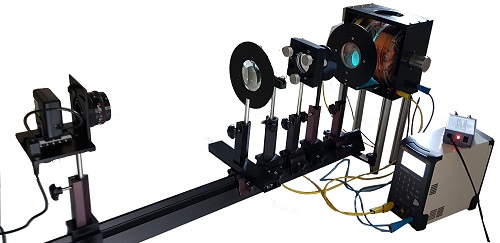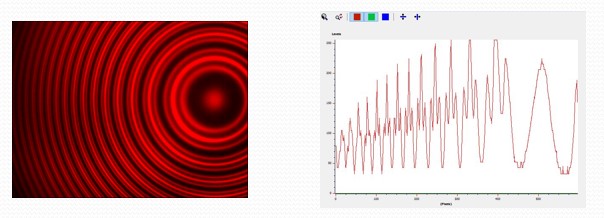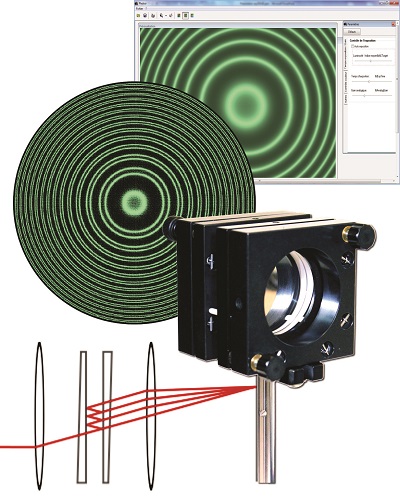Zeeman effect : EXP500030 or EXP500031
Référence : EXP 500 030

At the root of the Zeemen effect is the subdivision of the energy levels of atoms and molecules plunged into a magnetic field. According to conditions, the spectral lines are divided into an odd number (the effect is said to be “normal”) or an even number (the effect is said to be “abnormal”) of components. This phenomenon is visible to the naked eye or from a computer screen via the didactic webcam provided in this pack.
NORMAL EFFECT
To observe the Normal effect, we use the Cadmium lamp with a red filter to select the spectrum and observe only the red line of Cadmium leaving the Zeeman box containing the coils and the spectral source. We thus observe our source outside the magnetic field axis, perpendicular to it. We place first a diaphragm, then a condenser. We then place, behind them, the Fabry-Pérot etalon, previously adjusted, and finally our red filter just before placing our CCD sensor. For this exercise, we will not use the sensor lens but a camera lens, to ensure better image quality. We then plug in the power supply and increase slowly the current until we observe the rings that are divided into three. To observe the abnormal effect, we position ourselves in the magnetic field axis without using the diaphragm.
FABRY-PEROT STUDY - FINENESS
To be able to separate the different rings more efficiently, we need to have them as thin as possible. This is equivalent to
refining the peaks in the previous curve, i.e. reduce Δλ with respect to δλ. Thus, a good quality interferometer will exhibit a far lower Δλ than δλ.
The greater the fineness, the finer the rings. To increase fineness, the surfaces making up the cavity can be made highly reflective. Indeed, we can show that fineness increases at the same time as the surface reflection coefficient.
Consequently, Fabry-Perot interferometers can have finenesses of a few dozens or a few hundreds. In research, this can even attain a few hundred thousands. This high degree of fineness is a major asset of this type of interferometers with respect to Michelson’s interferometer, which has a fineness of 2.
SUBJECTS APPROACHED
»»Bohr atomic model
»»Normal and Abnormal effect
»»Fabry Pérot
»»Spinning electron
NECESSARY EQUIPMENT
The standard composition comes with a Cadmium brush spectral lamp.
As an optional extra, we offer you the complementary material to experience Mercury.
COMPOSITION
EXP500031 Zeeman effect (BASIC)
| Reference | Description | quantity | | POD013550 | Zeeman effect pack (Coils set + power supply+ Cadmium light) | 1 | | POF010112 | Optical bench, 1 m | 1 | | POF010124 | Standard optical rider | 6 | | POD061250 | Dual condenser/td> | 1 | | POD060410 | iris diaphragm | 1 | | POF020250 | Fabry Pérot etalon | 1 | | POM052022 | Red filter, plastic | 1 | | POD060230 | Slide holder | 1 | | POD608420 | diam 80-mm lens, f=+100 mm | 1 | | POD060130 | Holder for diam 80-mm lens | 1 | | POF010811 | Pedagogical webcam with adjustable lens | 1 |
computer is required for the webcam
COMPOSITION
EXP500030 Zeeman effect (COMPLETE)
| Reference | Description | quantity | | POD013550 | Zeeman effect pack (Coils set + power supply+ Cadmium light) | 1 | | POF010112 | Optical bench, 1 m | 1 | | POF010124 | Standard optical rider | 6 | | POD061250 | Dual condenser/td> | 1 | | POD060410 | iris diaphragm | 1 | | POF020250 | Fabry Pérot etalon | 1 | | POM052022 | Red filter, plastic | 1 | | POD060230 | Slide holder | 1 | | POD608420 | diam 80-mm lens, f=+100 mm | 1 | | POD060130 | Holder for diam 80-mm lens | 1 | | POF010811 | Pedagogical webcam with adjustable lens | 1 | | POD013553 | brush Mercury spectral lamp with its power supply | 1 | | POM052025 | Green filter, plastic | 1 |
computer is required for the webcam
|
|




